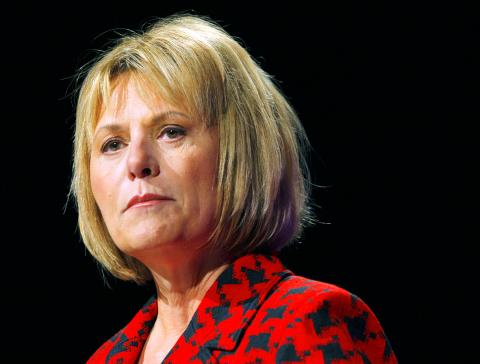Yahoo Inc chairman Roy Bostock fired CEO Carol Bartz over the telephone on Tuesday, ending a tumultuous tenure marked by stagnation and a rift with Chinese partner Alibaba (阿里巴巴).
Chief financial officer Tim Morse will step in as interim CEO, and the company will search for a permanent leader to spearhead a battle in online advertising and content with rivals Google Inc and Facebook.
Shares in Yahoo jumped 6 percent in after-hours trading to US$13.70 after closing at US$12.90 on the NASDAQ on Tuesday. They are scarcely higher than where they were when Bartz first took the reins in January 2009, with hopes of reviving stalled growth and competing with up-and--coming rivals.

Photo: Reuters
On Tuesday, her efforts were abruptly halted after Bostock called with the bad news.
“I am very sad to tell you that I’ve just been fired over the phone by Yahoo’s chairman of the board. It has been my pleasure to work with all of you and I wish you only the best going forward,” the outspoken CEO said in a two--sentence e-mail to employees.
The turn of events surprised few Wall Street observers who had tracked a rising torrent of -criticism and watched revenue growth falter and sputter out.
Some analysts said Bartz’s departure signaled the company had run out of options after failing to dominate the advertising and content markets and handing over its search operations to Microsoft Corp.
That partnership, under which Microsoft handles search for Yahoo’s Web sites and keeps a portion of ad revenue, appears to favor the software company at Yahoo’s expense.
Yahoo is still one of the most popular destinations on the Internet, but faces increasing competition from social networking service Facebook and from Google, which has a market value of US$170 billion, 10 times more than Yahoo.
Yahoo said a new executive leadership council would help Morse in managing day-to-day operations, as well as supporting “a comprehensive strategic review” to position the company for growth.
The decision to oust Bartz was reached by a unanimous vote of Yahoo’s eight independent directors late last week, according to a person close to the company.
Bartz and co-founder Jerry Yang (楊致遠), who are also on the board, did not participate in the vote, the person said.
Yahoo is worth about US$16 billion, with much of that ascribed to its roughly 40 percent stake in Alibaba, the parent company of Web sites including Alibaba.com and Taobao (淘寶). Yahoo also owns a stake in Yahoo Japan, along with Japanese mobile company Softbank.

Micron Memory Taiwan Co (台灣美光), a subsidiary of US memorychip maker Micron Technology Inc, has been granted a NT$4.7 billion (US$149.5 million) subsidy under the Ministry of Economic Affairs A+ Corporate Innovation and R&D Enhancement program, the ministry said yesterday. The US memorychip maker’s program aims to back the development of high-performance and high-bandwidth memory chips with a total budget of NT$11.75 billion, the ministry said. Aside from the government funding, Micron is to inject the remaining investment of NT$7.06 billion as the company applied to participate the government’s Global Innovation Partnership Program to deepen technology cooperation, a ministry official told the

Taiwan Semiconductor Manufacturing Co (TSMC, 台積電), the world’s leading advanced chipmaker, officially began volume production of its 2-nanometer chips in the fourth quarter of this year, according to a recent update on the company’s Web site. The low-key announcement confirms that TSMC, the go-to chipmaker for artificial intelligence (AI) hardware providers Nvidia Corp and iPhone maker Apple Inc, met its original roadmap for the next-generation technology. Production is currently centered at Fab 22 in Kaohsiung, utilizing the company’s first-generation nanosheet transistor technology. The new architecture achieves “full-node strides in performance and power consumption,” TSMC said. The company described the 2nm process as

Shares in Taiwan closed at a new high yesterday, the first trading day of the new year, as contract chipmaker Taiwan Semiconductor Manufacturing Co (TSMC, 台積電) continued to break records amid an artificial intelligence (AI) boom, dealers said. The TAIEX closed up 386.21 points, or 1.33 percent, at 29,349.81, with turnover totaling NT$648.844 billion (US$20.65 billion). “Judging from a stronger Taiwan dollar against the US dollar, I think foreign institutional investors returned from the holidays and brought funds into the local market,” Concord Securities Co (康和證券) analyst Kerry Huang (黃志祺) said. “Foreign investors just rebuilt their positions with TSMC as their top target,

H200 CHIPS: A source said that Nvidia has asked the Taiwanese company to begin production of additional chips and work is expected to start in the second quarter Nvidia Corp is scrambling to meet demand for its H200 artificial intelligence (AI) chips from Chinese technology companies and has approached contract manufacturer Taiwan Semiconductor Manufacturing Co (TSMC, 台積電) to ramp up production, sources said. Chinese technology companies have placed orders for more than 2 million H200 chips for this year, while Nvidia holds just 700,000 units in stock, two of the people said. The exact additional volume Nvidia intends to order from TSMC remains unclear, they said. A third source said that Nvidia has asked TSMC to begin production of the additional chips and work is expected to start in the second